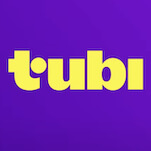The streaming business is a demanding mistress. It’s dragged the entire entertainment industry into the digital age at great cost—the plummet of cable, the slow fade of broadcast, the crumbling of theatrical. And even after totally reinventing entertainment as we know it, streaming barely even turns a profit for most companies that have invested in it. That includes Tubi, currently the dark horse favorite of the streaming wars and a pioneer in the FAST (free, ad-supported streaming television) sector. We’ve talked about how well Tubi has been doing lately: Its audience numbers surpass many of the major streamers (Peacock, Apple TV+, etc.), are tied with Disney+, and fall behind only Netflix, Amazon, and Hulu (the three streamers that have been around the longest). An analyst estimated for The New York Times that Tubi generated $900 million in revenue over the last year, compared to an estimated $775 million the year before. Nevertheless, Tubi still hasn’t turned a profit, though the company’s chief executive Anjali Sud told the NYT that “Our lack of profitability is a conscious choice.” Uhh… sure, why not! Guess Tubi is going for an “I did it my way” path to profitability. In fairness, and as previously mentioned, it is an absolute slog to turn a profit in streaming. It took Netflix many, many years to do so, and that company had a giant head start as the first-ever streaming service. Tubi’s current rival for viewership, Disney, only just turned a streaming profit for the first time last quarter, and that’s from all its services (Disney+, Hulu, and ESPN+) combined, according to The Verge. All this to say, Tubi is still on a promising trajectory, with a strategy that includes making original content for cheap and licensing a dense catalog of old and esoteric programming. Tubi execs indicated to the NYT that they expect their service to become more and more attractive to audiences as the other streamers raise prices and slash content, because, as one analyst observed to the outlet, “People love free.”



























